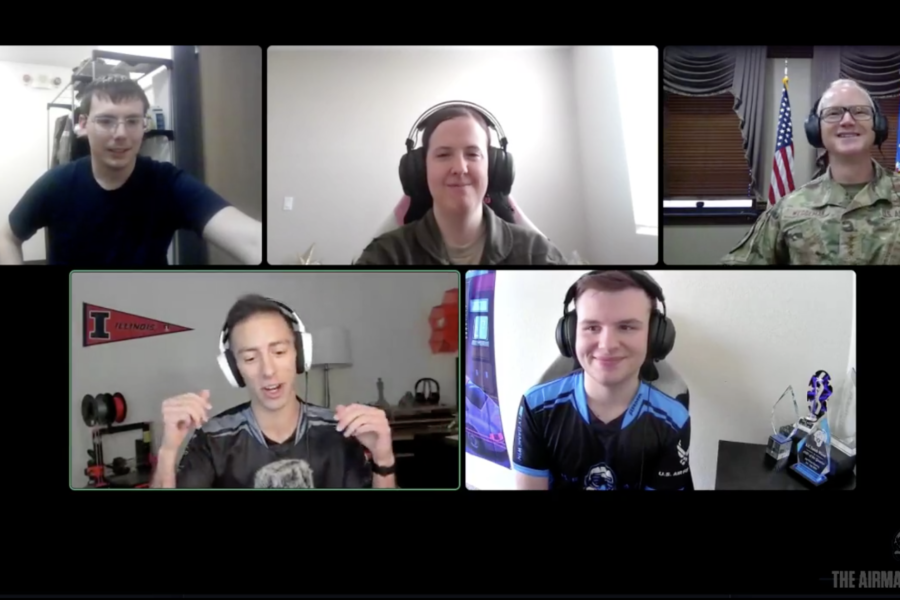When Capt. Oliver Parsons was a missileer assigned to Minot Air Force Base, N.D., from 2014 to 2018, the long, grueling winters started to take a toll on his mental health. He and his wife turned to video games as an escape from feelings of depression and anxiety. But they also realized they needed to connect with other people.
Moving on to Vandenberg Air Force Base, Calif., the Parsons discovered gaming events like TwitchCon and began to connect with other Airmen gamers. They were struck that, while the Army and Navy had organized gamer communities, the Air Force didn’t have any such thing. So in 2019, Parsons and a group of friends decided to start their own.
Air Force Gaming grew into a 24/7 grassroots organization focused on building resiliency and retention, and now it is officially part of the Air Force Services Center. Some 14,000 Airmen and Guardians play on the dedicated Air Force Gaming platform, an esports hub built for the Department of the Air Force; 20,000 play on the original Discord platform. Since their official launch last November, Air Force Gaming participants have logged 115,000 voice minutes and more than 100,000 text chats among Airmen and Guardians.
Now the U.S. military’s first official esports league is going global. Airmen and Guardians at bases around the world can form teams and play in a seasonal intramural league that will culminate in a March Madness-style championship tournament. Participants can play Call of Duty, Rocket League, or League of Legends. Airman and Guardians who don’t want to commit to league play can instead sign up for weekend tournaments, said Parsons, who now serves as the deputy chief of sports fitness and readiness under AFSC.
“We knew there was an appetite for gaming from our Airmen and Guardians, but this program has already exceeded our expectations,” Col. Marc Adair, director of operations at the Air Force Services Center, said in a release. “Air Force Gaming has created a community where our Airmen and Guardians do so much more than just play video games. I’ve heard stories of friendships and camaraderie, and that’s what this program is really all about.”
Senior leaders are starting to take notice.
Capt. Zach Baumann, one of the co-founders of Air Force Gaming, recently played (and beat) Lt. Gen. Christopher P. Weggeman, Air Combat Command’s deputy commander, in a game of chess in his regular The Airman’s Gambit series. As they played, they talked about a variety of things, from the integration of the 24th and 26th Air Forces into the 16th Air Force to Weggeman’s personal journey from fighter pilot to digital strategist for the Department of the Air Force.
Baumann asked the three-star what it means to be a digital Airman, saying there is a perception that the service expects everyone to be “100-percent very techy coders.”
Weggeman used the chess game to highlight the “spectrum” of digital Airmen in the service, calling the 29-year-old a “digital native” and himself a “digital immigrant.”
“Based on when you were born, you grew up amongst all this digital, internet of things. You’ve had smartphones your whole life,” he told Baumann. “I’m a digital immigrant. In my formative years, we didn’t have any of that technology. I literally remember playing Atari, having my first game cartridges plug into a console, and putting quarters in Pacman and Centipede. … So, you are all digital natives, and we’re digital immigrants and we’re cohabitating together.”
Weggeman said a digital Airman needs to be aware of the digital ecosystem, and understand how “we all leave exhaust everywhere we go that can be harnessed for good and bad.” Digital Airmen must also understand there are some things computers can simply do better than people, and some things that humans are really good at. They shouldn’t be “threatened by that idea,” Weggeman added.
Baumann took the opportunity to share with Weggeman that 75 percent of the Air Force Gaming community is between the ages of 18-34, saying “I really see this community that’s been building and kind of exploding, snowballing because people are engaging online. These are tomorrow’s leaders.”
Parsons said the Air Force chaplain corps also is looking to get more involved, noting the next Airman’s Gambit will feature Maj. Gen. Steven A. Schaick, chief of chaplains, on March 23. Airmen and Guardians who want to tune in for that event can watch it live on Air Force Gaming’s Facebook page.
Air Force Gaming also is starting to work with the Air Force Research Laboratory’s war gaming department. “We’re going to start integrating their projects that they’re doing with our community,” he said. “And, you know, building out that digital Airman, that digital Guardian, lethality. You know, there are common interests there, whether it’s testing games that they’re doing, looking for ideas, or finding that security forces senior airman that actually is like an amazing coder.”
The organization also is working with the Air Force’s Digital University.
Parsons said such partnerships could foster “good conversations” and allow more senior USAF officials to hear from and understand perspectives from a different generation.
“We like to say Air Force Gaming’s a movement, you know, and we’re seeing these pieces start to connect, and I can’t really imagine what it’s going to be like … a year, two years, five years from now,” Parsons said.
